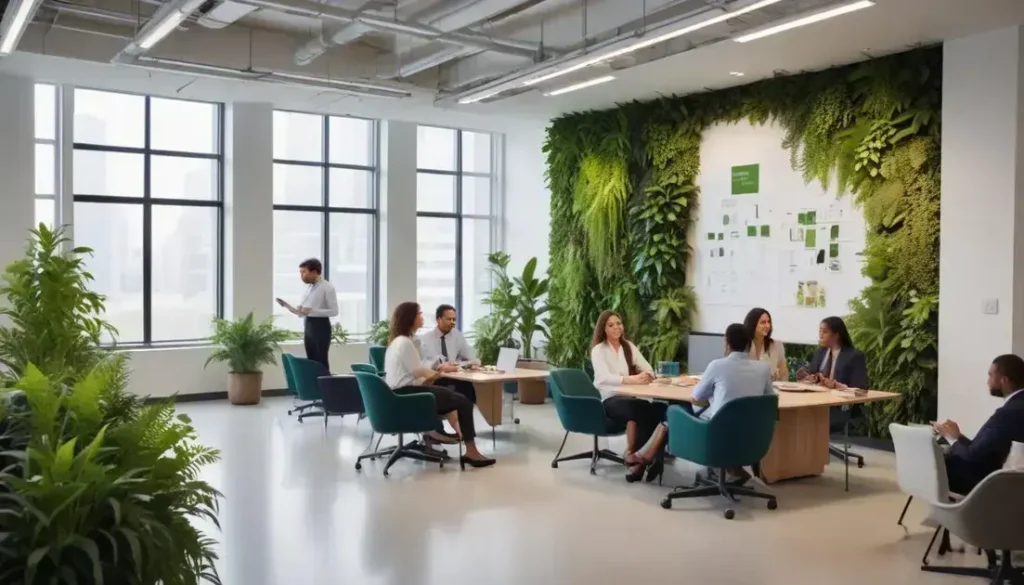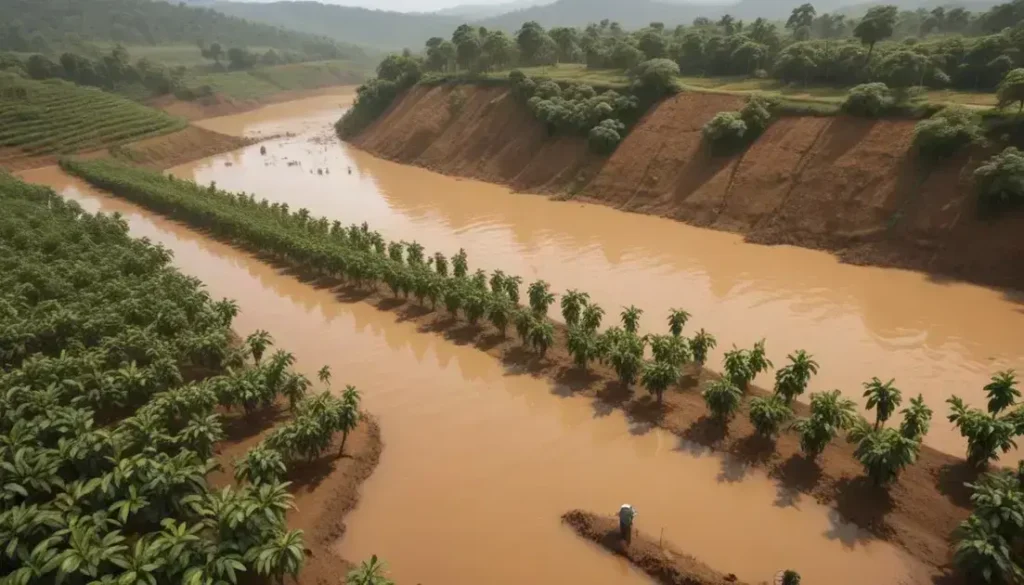McCormick & Company is actively enhancing its sustainability through initiatives such as sustainable sourcing, waste management, and community engagement, which not only improve environmental outcomes but also drive business growth and consumer trust in the Australian market.
Sustainability in the corporate landscape is set to evolve with Kathy Rostkowski’s new role as CSO at McCormick & Company. How will this impact Australian businesses?
Introduction to Kathy Rostkowski’s Role
Kathy Rostkowski steps into a pivotal role at McCormick & Company as the new Chief Sustainability Officer (CSO). With over 20 years of experience, her leadership promises to steer the company’s sustainability initiatives toward even greater heights. Kathy’s background in food science and her previous positions within the company underline her commitment to advancing sustainable practices.
As industries increasingly prioritise sustainability, Kathy’s appointment marks a significant shift for McCormick, aiming to enhance their environmental stewardship. She is set to focus on innovative solutions addressing climate change, responsible sourcing, and reducing waste throughout the supply chain. Consumer preferences are also evolving, and McCormick aims to meet these expectations with integrity.
Her proven track record in implementing effective sustainability strategies will be crucial as McCormick navigates the complex challenges of today’s food landscape. Kathy’s vision includes fostering partnerships with suppliers and stakeholders to create a more transparent and accountable supply chain. This is essential for driving positive change within the industry and ensuring McCormick remains at the forefront of the sustainability movement.
Transitioning Leadership in McCormick
The transition of leadership at McCormick & Company is a key moment for the organisation. With Kathy Rostkowski taking on the role of Chief Sustainability Officer, there is a renewed focus on integrating sustainability into the company’s core operations. This shift aims to elevate McCormick’s commitment to environmentally responsible practices.
Leadership transitions are critical, particularly in a sector where consumer expectations continually evolve. Kathy’s previous experience and understanding of McCormick’s culture position her well to navigate these changes. Effective leadership is essential for fostering a culture of innovation, especially in sustainability.
As the new CSO, Kathy will collaborate closely with other executives to ensure that sustainability goals align with business objectives. This collaborative approach strengthens McCormick’s mission to create a positive impact on the environment and society. Under her guidance, there is potential for strategic initiatives that enhance transparency and accountability throughout the supply chain.
Furthermore, Kathy’s leadership will inspire team members to embrace sustainable practices at all levels. Encouraging a shared vision of sustainability can lead to impactful changes, ensuring that McCormick not only meets but exceeds industry standards. This transition marks a hopeful future for McCormick as it continues to lead in sustainability.
Dr. Michael Okoroafor’s Legacy
Dr. Michael Okoroafor leaves behind a remarkable legacy at McCormick & Company, characterized by his unwavering commitment to sustainability and innovation. As the former Chief Sustainability Officer, he played a pivotal role in shaping the company’s sustainability direction. His efforts have significantly advanced McCormick’s reputation as a leader in corporate responsibility.
During his tenure, Dr. Okoroafor championed initiatives that focused on sustainable sourcing, reducing environmental impact, and enhancing community engagement. He believed that a company’s success is intertwined with its environmental stewardship and social impact. His holistic approach to sustainability has inspired others in the industry to follow suit.
One notable achievement was the implementation of robust programs aimed at reducing waste throughout the supply chain. This included innovative packaging solutions and partnerships with suppliers to promote transparency and sustainability. Through these efforts, Dr. Okoroafor demonstrated that businesses can thrive while being responsible stewards of the planet.
His legacy continues to influence McCormick’s ongoing sustainability strategy, ensuring that the company remains committed to its goals. By fostering a culture of responsibility and accountability, Dr. Okoroafor has set a high standard that will guide McCormick’s future leaders in their sustainability journeys.
Overview of McCormick & Company’s Sustainability Goals
McCormick & Company has established a comprehensive framework to guide its sustainability goals. These objectives aim to enhance the company’s commitment to environmental responsibility and social equity. A significant aspect of their goals is to achieve carbon neutrality by 2025 across their global operations, reflecting a progressive stance towards climate change.
Another vital target includes sourcing 100% of their raw materials sustainably. This means collaborating with farmers to ensure responsible agricultural practices while enhancing productivity. McCormick’s efforts extend to protecting biodiversity and promoting sustainable farming techniques.
Water conservation is also a priority, with initiatives focused on reducing water usage across their manufacturing sites. By investing in efficient technologies, McCormick aims to significantly lower its overall water footprint, contributing to broader global water preservation efforts.
In addition to environmental targets, McCormick’s sustainability goals encompass social responsibility. The company is dedicated to fostering diversity and inclusion within its workforce, creating an environment where all employees can thrive. These multifaceted objectives not only position McCormick as a leader in sustainability but also align closely with evolving consumer expectations for corporate accountability.
Kathy Rostkowski’s Professional Background
Kathy Rostkowski brings a wealth of experience to her role as Chief Sustainability Officer at McCormick & Company. Her professional journey spans over two decades, primarily focused on the food industry and sustainability practices. Prior to joining McCormick, Kathy held key positions at renowned companies where she developed and implemented innovative sustainability initiatives.
Her expertise lies in integrating sustainability into operational strategies, ensuring that environmental considerations are at the forefront of business decisions. Kathy has successfully led numerous projects aimed at reducing waste, improving energy efficiency, and enhancing overall organizational sustainability metrics.
Educationally, Kathy holds a degree in Food Science, which she successfully leverages to understand the complexities of the food supply chain. This background not only equips her with technical knowledge but also enables her to foster collaborations with stakeholders across various sectors. Her ability to communicate effectively with both technical and non-technical audiences positions her as a valuable leader in sustainability.
Furthermore, Kathy is committed to continuous learning, regularly engaging with industry trends and innovations. This dedication ensures that McCormick remains ahead in the rapidly changing landscape of sustainability. Her leadership is expected to drive significant advancements within the company, particularly as consumer expectations for sustainable practices continue to rise.
Key Sustainability Initiatives at McCormick
McCormick & Company has embarked on several key sustainability initiatives that underscore its commitment to environmental stewardship and social responsibility. One of the most significant initiatives is their Project Sustain, which aims to enhance sustainable sourcing practices across their entire supply chain. This project ensures that raw materials are obtained in an environmentally responsible manner, benefiting both the planet and the communities involved in production.
Additionally, McCormick has invested in innovative technologies to reduce waste within its manufacturing processes. By implementing advanced recycling programs and waste minimisation strategies, the company strives to divert a substantial portion of its waste from landfills. This not only supports their sustainability goals but also lowers operational costs.
Water conservation is another critical focus area, with McCormick working to optimise water usage across all facilities. The company has set ambitious targets to cut water consumption per product by 25%, highlighting its proactive approach to managing this vital resource.
Moreover, McCormick actively engages in community development through educational programs related to sustainability and healthy eating. By partnering with local organisations, they aim to foster awareness and action towards sustainable practices within communities. These initiatives reflect McCormick’s holistic approach to sustainability, integrating environmental, social, and economic considerations into its core business strategies.
Climate Action Plans and Targets
McCormick & Company has established robust climate action plans to address the urgent need for corporate responsibility toward climate change. Central to these plans is the commitment to achieve carbon neutrality by 2025 across its global operations. This ambitious target highlights McCormick’s dedication to reducing its environmental footprint while maintaining operational excellence.
To achieve this, the company is implementing a variety of strategies, including significant investments in renewable energy sources. By transitioning to solar and wind energy, McCormick aims to power its facilities with clean energy, reducing greenhouse gas emissions significantly. Additionally, the company is enhancing its energy efficiency measures through advanced technologies and smarter operational practices.
Another key element of McCormick’s climate action plans is the emphasis on sustainable sourcing. By collaborating with farmers and suppliers, the company promotes practices that protect the environment and bolster local economies. This approach not only addresses climate concerns but also strengthens McCormick’s supply chain resilience.
Furthermore, McCormick actively monitors its progress towards these targets, conducting regular assessments to ensure accountability. By openly sharing its climate goals and progress with stakeholders, McCormick fosters transparency and encourages others in the industry to prioritise climate actions. These comprehensive plans illustrate McCormick’s commitment to a sustainable future.
Sustainable Sourcing Practices
Sustainable sourcing practices are a cornerstone of McCormick & Company’s commitment to corporate responsibility. This approach focuses on procuring raw materials in ways that are environmentally friendly, socially responsible, and economically viable. By collaborating closely with farmers and suppliers, McCormick ensures that its sourcing aligns with sustainability goals.
One key aspect of sustainable sourcing is the emphasis on responsible agriculture. McCormick works with farmers to implement production techniques that protect the environment while allowing for the production of high-quality ingredients. This includes promoting crop diversity, minimizing pesticide use, and enhancing soil health through organic practices.
Additionally, McCormick is committed to transparency in its supply chain. The company actively engages in traceability initiatives, allowing consumers to understand where their food comes from. This transparency fosters trust and encourages sustainable practices among suppliers.
Another important element is McCormick’s investment in community development. By providing training and resources to local farmers, the company helps improve their livelihoods and ensures that sourcing practices support local economies. This collaborative approach not only enhances sustainability but also contributes to the resilience of global food systems.
Community Impact Initiatives
McCormick & Company actively engages in community impact initiatives that reflect its commitment to social responsibility and sustainable development. These initiatives focus on strengthening local communities, particularly those involved in the supply chain. By partnering with local organisations, McCormick aims to foster educational and economic opportunities for the people they support.
One significant aspect of their community initiatives is the promotion of nutrition education. McCormick conducts workshops and programs that educate families about healthy eating habits. This not only improves the well-being of community members but also encourages the consumption of sustainable and locally sourced foods.
Additionally, McCormick is dedicated to enhancing the livelihoods of farmers through training and resources. By providing farmers with the tools they need to succeed, the company helps boost local economies and promote responsible agricultural practices. This investment in human capital is crucial for building resilient communities.
Moreover, McCormick supports initiatives that focus on environmental stewardship at the community level. These efforts include community clean-up projects and tree planting campaigns, which help improve local ecosystems. Through these multifaceted initiatives, McCormick not only enriches the lives of individuals but also promotes a shared vision for a sustainable future.
Water and Waste Management Strategies
Water and waste management strategies are integral to McCormick & Company’s sustainability efforts. The company recognises the critical importance of responsible water usage in its operations, particularly in manufacturing processes. McCormick has set ambitious goals to reduce water consumption, targeting a 25% decrease per product by 2025. This goal underlines their commitment to conserving this precious resource.
To achieve this, McCormick has implemented advanced technologies designed to optimise water efficiency. By using recycling systems and rainwater harvesting techniques, the company reduces its reliance on freshwater sources. Additionally, McCormick conducts regular audits of water usage across its facilities, identifying areas for improvement.
On the waste management front, McCormick aims to divert as much waste as possible from landfills. This is achieved through comprehensive recycling and composting programs, which contribute significantly to their overall waste reduction targets. The company works closely with suppliers and partners to enhance waste minimisation practices throughout the supply chain.
Furthermore, McCormick engages its employees in sustainability efforts, encouraging them to adopt waste reduction practices at work. This holistic approach not only supports environmental goals but also fosters a culture of sustainability within the organisation. Overall, McCormick’s water and waste management strategies reflect a proactive commitment to environmental stewardship.
Future Directions for McCormick
The future directions for McCormick & Company are rooted in a strong commitment to sustainability and innovation. As the food industry evolves, McCormick is poised to lead by embracing new technologies and practices that enhance their sustainability efforts. This includes ongoing investments in environmentally friendly technologies and processes that reduce their carbon footprint while ensuring high-quality product offerings.
One key focus for the future is expanding the use of plant-based ingredients. As consumer demand for healthier and more sustainable food options grows, McCormick aims to innovate its product lines with plant-based alternatives that appeal to a broader audience. This aligns with trends towards healthier eating and a shift away from animal-based products.
Moreover, McCormick plans to enhance its supply chain transparency. By implementing advanced traceability technologies, the company seeks to provide consumers with detailed information about the sourcing and production of their products. This transparency builds trust and promotes a sense of accountability in product safety and quality.
Additionally, engaging with local communities and stakeholders will remain a priority. By fostering strong partnerships, McCormick hopes to drive positive change not only within its operations but also in the agricultural communities it supports. These future directions reflect McCormick’s vision of a sustainable, innovative, and connected food industry.
Implications for Australian Businesses
The implications of McCormick & Company’s sustainability initiatives for Australian businesses are significant. As global focus shifts toward sustainable practices, local companies are encouraged to adopt similar strategies to remain competitive and meet rising consumer expectations. Australian businesses, particularly in the food sector, must consider how sustainability impacts their supply chains and overall operations.
With increasing scrutiny from consumers and regulatory bodies, businesses are now compelled to demonstrate their commitment to environmental responsibility. This translates to implementing sustainable sourcing practices that align with those being employed by industry leaders like McCormick. Local producers may need to enhance their partnerships with growers and suppliers to ensure that they are sourcing ingredients responsibly.
Additionally, the push for carbon neutrality and reduced waste can inspire Australian businesses to innovate. Investing in efficient technologies and waste management systems not only helps in reducing costs but also positions companies as leaders in sustainability within their market.
Furthermore, embracing sustainability can lead to improved customer loyalty as consumers increasingly favour brands that prioritise ethical practices. For Australian businesses, aligning with global shifts towards sustainability could unlock new opportunities in both domestic and international markets, ultimately driving growth and success in an evolving landscape.
In Summary: Embracing Sustainability for a Better Future
McCormick & Company’s commitment to sustainability offers valuable lessons for businesses worldwide, especially in Australia. By adopting sustainable practices, companies can not only enhance their reputation but also improve operational efficiency and reduce costs.
As consumers increasingly demand environmentally responsible products, it is crucial for Australian businesses to adapt to these changing expectations. Embracing sustainability can foster customer loyalty and set a strong foundation for future success.
Moreover, collaboration with suppliers and the community can lead to innovative solutions that benefit all stakeholders. By working together, businesses can create a positive impact on the environment and promote a more sustainable food system.
Ultimately, the journey towards sustainability is not just a trend but a necessity for long-term growth and success in today’s market. Businesses that prioritise sustainable practices will be well-positioned to thrive in the future.
Frequently Asked Questions
What are the key sustainability initiatives that McCormick is undertaking?
McCormick is focusing on sustainable sourcing, water conservation, waste management, and community engagement to enhance its overall sustainability.
How can Australian businesses benefit from adopting sustainability practices?
By adopting sustainability practices, Australian businesses can increase their competitiveness, improve customer loyalty, and potentially reduce operational costs.
Why is transparency in the supply chain important for companies?
Transparency in the supply chain builds trust with consumers, demonstrating commitment to ethically sourced and environmentally friendly products.
What role does community engagement play in sustainability?
Community engagement helps businesses understand local needs, fosters goodwill, and can lead to collaborative initiatives that benefit both the company and the community.
How can water conservation impact a business’s sustainability goals?
Effective water conservation not only reduces costs for businesses but also demonstrates environmental responsibility, which is increasingly important to consumers.
What future trends should Australian companies watch regarding sustainability?
Australian companies should watch for trends towards plant-based products, technological advancements in sustainability, and increased consumer demand for ethical sourcing.


